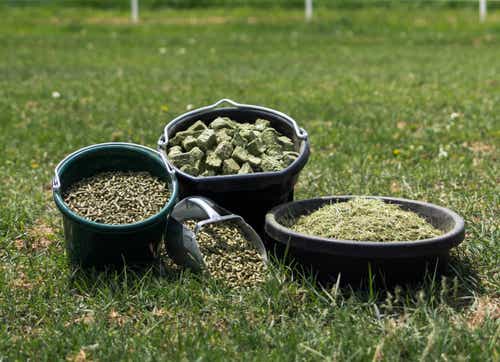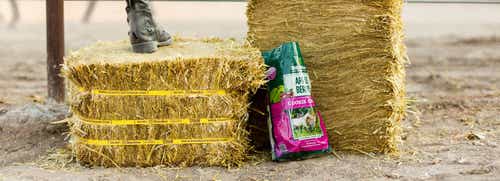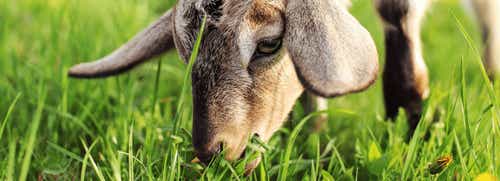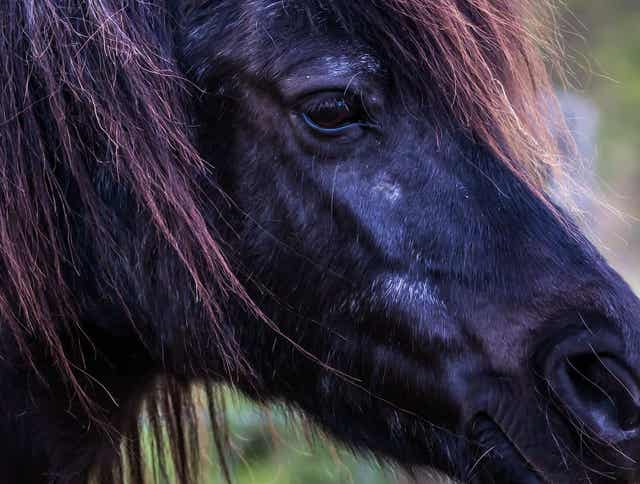
How Can I Get My Stubborn Cushing’s Horse to Take Medication?
Cushing’s Disease & Ensuring Medication Intake
What is it?
Cushing's disease, also known as PPID (pituitary pars intermedia dysfunction), is a progressive disorder that begins with the dysfunction of the pituitary gland. This gland, at the base of the brain, sends out a number of hormones, and a horse with Cushing’s disease starts to send out more hormones causing a number of symptoms.
What are the symptoms?
The most common symptom is a long, curly hair coat that fails to shed during the change from winter to summer. Other symptoms include:
- Excessive sweating
- Lethargy
- Poor athletic performance
- Infertility
- Muscle wasting (especially along the top line)
- Abnormal fat distribution (accumulations in the crest of the neck, along the tail head, sheath, and above the eyes)
- Delayed wound healing
- Increased susceptibility to infections
- Increased water consumption with passage of large amounts of urine.
Cushing's tends to occur in middle-aged and older horses, around age twenty. Without treatment, symptoms tend to worsen over time and can be fatal. Symptoms are easily observed in advanced cases.
What are the causes?
Cushing's disease is caused by a hormone-secreting tumor on the pituitary gland at the base of the horse's brain. The tumor causes an over-production of hormones resulting in the observed symptoms.
Diagnosis:
Diagnosis of early cases or those characterized by few obvious clinical signs can be more difficult. There are two clinical tests available, a dexamethasone suppression test and a plasma ACTH measurement test. Consult your veterinarian for the appropriate tests if you suspect your horse has Cushing’s disease.
Feeding & Management:
These horses are often insulin-resistant and have high blood sugar levels, so non-structural carbohydrates (NSC, sugar and starch) need to be minimized. For most horses with Cushing's Disease, feeding recommendations are to provide a total diet with less than 15% sugar and starch. Pasture grasses can have high sugar content, especially during the spring and fall seasons. Since laminitis and founder are more common in horses with Cushing's disease, pasture grazing should be severely limited or totally avoided. Regular exercise reduces blood glucose levels, so it will help horses with Cushing’s disease.
Standlee Premium Western Forage offers several products that can be beneficial in the feeding program of horses with Cushing’s including:
- Premium Alfalfa Pellets or Organic Alfalfa Pellets
- Premium Alfalfa Cubes
- Premium Alfalfa Chopped
- Alfalfa Bales – Premium Alfalfa Compressed or Premium Alfalfa Grab & Go® Compressed
Standlee Premium Western Forage also now produces Teff forage products. Teff is a warm season grass with low NSC values and less calories than other grasses which is ideal for overweight, carbohydrate sensitive horses.

A unique product to Standlee Premium Western Forage is the Horse Pill Carriers®. These offer a convenient way to disguise common prescription medications that are given to horses with Cushings. The manufacturer’s recommendations for these medications is once-a-day treatment. Recent research in Australia evaluated twice daily dosing* of pergolide may be more effective (Rendle, 2019). The thought of giving medication once a day is overwhelming for most horses owners let alone twice daily, however with Standlee Premium Western Foragee Horse Pill Carriers, this can be stress free.
Standlee Premium Western Forage Horse Pill Carriers are naturally flavored with fenugreek seed. Researchers in England studied the top flavors selected by horses, and fenugreek, banana and cherry topped the list.* The forage in Standlee’s Horse Pill Carriers® is also not super finely chopped. The fiber length offers a normal texture to the horse and also helps to cover the texture of any medication you may be providing.
*Always work with your veterinarian when developing a medication/dosing plan for your animal.
See what Jett, a 30-year-old Thoroughbred with Cushing’s disease, thinks of the Pill Carriers (Video Credit - Nancy Dunn-Glass):
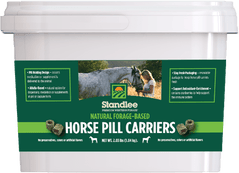
Comment on Facebook or on our blog about how stubborn your horse is when taking medication to be entered to win a free bucket of Standlee Horse Pill Carriers®! Giveaway will end on 4/30/2020.
Don’t let your horse’s stubbornness get in the way of medicating; try the Standlee Horse Pill Carriers® today. It’s a win for you and a win for your horse! Find a store closest to you carrying the product or purchase on Amazon.
By Dr. Tania Cubitt & Dr. Stephen Duren
Performance Horse Nutrition
*Pharmacokinetics and pharmacodynamics of pergolide mesylate after oral administration in horses with pituitary pars intermedia dysfunction. Rendle DI, Doran G, Ireland J, Edwards S. Domest Anim Endocrinol. (2019) 68; p135-141.
*Goodwin, D., Selection and acceptance of flavours in concentrate diets for stabled horses, Applied Animal Behaviour Science, Volume 95, Issue 3, Pages 223-232, December 2005.


